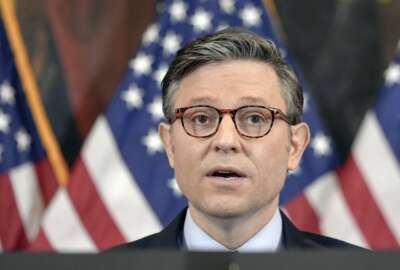House seeks charges for tech official in Clinton email case
A congressional committee wants the Justice Department to consider criminally prosecuting the head of a technology company that was involved in maintaining a...
WASHINGTON (AP) — A congressional committee on Thursday asked the Justice Department to consider criminally prosecuting the head of a technology services company that was involved in maintaining a private email server for Hillary Clinton.
The House Science, Space, and Technology Committee accused Colorado-based Platte River Networks and its chief executive, Treve Suazo, of withholding documents demanded under subpoena and of obstructing the committee’s investigation “at every turn.”
The allegations were made in a referral to Attorney General Jeff Sessions that was obtained by The Associated Press. Kenneth Eichner, a lawyer for the company, said he was confident the Justice Department had “moved on,” but he declined further comment.
A referral for prosecution from Congress has no practical impact on the Justice Department, which decides on its own whether evidence exists to investigate a matter or to pursue criminal charges. A Justice Department spokesman declined to comment Thursday.
The FBI last July closed its investigation into Clinton’s use of a private email server without recommending charges for the former secretary of state or anyone else. But since then, Republican-led congressional committees have made multiple referrals of their own to the Justice Department for potential prosecution.
One referral sought an investigation into whether Clinton, the Democratic presidential nominee in 2016, had lied to Congress. A second referral was about whether Clinton or others who worked with her played a role in the deletion of thousands of her emails. In February, another referral was sent seeking criminal charges against the computer specialist who helped establish Clinton’s email server.
Democrats have called the referrals politically motivated and a waste of time.
Still, the new letter from the committee chairman, Rep. Lamar Smith, R-Texas, holds the prospect of reviving the divisive, politically charged debate over the Clinton email investigations and shows the lingering anger from members of Congress about the outcomes of those probes.
In the letter, Smith alleges that Suazo and his lawyer repeatedly turned aside demands for documents without making any “valid legal arguments.”
Smith said that in September, when Platte River Networks responded to a subpoena from a month earlier, “the company categorically misinterpreted the language” of the demand and stated, incorrectly, that it had no relevant documents to provide. After the company was served with a second subpoena, it responded by saying that its employees were “ceasing voluntary cooperation,” Smith said in the letter.
In a statement, Smith said he would not tolerate an obstruction of a congressional investigation.
“With a new administration in place, I am hopeful that the Department of Justice will appropriately respond to the referral. We cannot allow companies with valuable information to stonewall us in our oversight efforts,” Smith said in a statement.
Platte River Networks began managing the Clinton server in 2013. The company in 2015 provided the server to the FBI, which conducted a yearlong investigation into the potential mishandling of classified information.
FBI files released last year show that Clinton aide Cheryl Mills had instructed a Platte River engineer in 2014 to delete all emails from the server that were older than 60 days old. But the engineer apparently forgot to delete the files and didn’t realize that until March 2015, weeks after the public revelation of Clinton’s use of a personal email server.
According to the FBI files, the engineer told agents that “he believed he had an ‘oh, (expletive)’ moment,” and deleted the archived emails sometime during the last week of March 2015. The engineer used a program BleachBit to delete the files in ways thought to make them unrecoverable, the FBI records said.
In his referral letter, Smith said the “anecdote demonstrates that PRN employees have direct knowledge and materials that answer key questions the Committee has related to the level of cybersecurity of former Secretary Clinton’s server and network, and that PRN was keenly aware that it had responsive information to the Committee’s investigation.”
FBI Director James Comey has said he had no basis to find that the deletions of Clinton’s emails were aimed at concealing evidence.
___
Follow Eric Tucker on Twitter at http://www.twitter.com/etuckerAP
Copyright © 2024 Federal News Network. All rights reserved. This website is not intended for users located within the European Economic Area.





